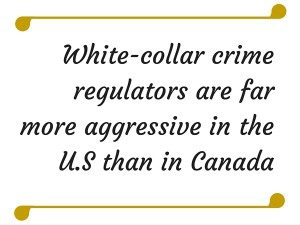Investors should protect themselves against white-collar crime
October 1, 2015

White-collar crime is a non-violent crime committed by someone for financial gain, and your personal investments may be at risk. In the real world, bad things can happen.
Theft for financial gain can occur in different ways. A bank robbery is a public event where money is stolen and the thieves run out of the bank and speed away in a waiting car.
There is no doubt in anyone’s mind a crime has been committed.
White-collar crime is another way money can be stolen. It is far more subtle and often flies under the radar.
Last week the Canadian Club of Halton Peel hosted one of their Dinner Speaker evenings. Oakville resident Anita Anand LL.M. spoke on “White Collar Crime & Punishment”.
Anita Anand is a Professor of Law & Academic Director, Centre for the Legal Profession and Program on Ethics in Law and Business, at the University of Toronto. She is an expert on white-collar crime.
Professor Anand said the laws pertaining to white-collar crime have two objectives. The first is to maintain the integrity of capital markets.
Every day billions of dollars change hands in the investment world. Without laws to protect participants there would be no trust. A lack of trust would undermine confidence and discourage participation in these markets.
From a basic economic prospective Canada must have capital markets that allow governments and businesses to raise funds. This is the foundation of our economy.
The second objective of white-collar crime legislation is to protect the investor. You are the investor and you need protection.
According to Professor Anand, white-collar crime can be hard to prove so enforcement of the law can be problematic, resulting in few convictions.
If the criminal is caught and convicted, the next concern is with the light penalties they receive. To me, that seems like an environment that favours and encourages white-collar crime.
 The obvious question is what can be done? Professor Anand said American regulators are far more aggressive at combating white-collar crime than we are in Canada.
The obvious question is what can be done? Professor Anand said American regulators are far more aggressive at combating white-collar crime than we are in Canada.
She discussed some of the solutions that could be put in place to better protect Canadians. Hopefully improvements will be made, but in the meantime you could be at risk.
Our advice to investors is to be aware that white-collar crime exists and to be careful to guard against it. Yes, there are certain laws to protect you however each and every one of us has a responsibility to be diligent.
There are many ways your money can be stolen. Remember a few years ago the well respected American hedge fund manager Bernie Madoff stole over $50 billion from clients in a bogus Ponzi scheme?
We have had similar crimes in Canada. A Ponzi scheme is theft. A fraudulent investing scam promising returns too good to be true. Money taken from some investor accounts to pay other investors a high and false return.
This works as long as new capital comes in and if few people redeem their funds. Simply put, it is a house of cards that eventually collapses and can cost investors their life savings.
White-collar crime can be anything from an elaborate Ponzi scheme to false emails or telephone calls requesting you to send money.
Your own diligence and good judgement is essential to protect yourself.
RELATED ARTICLES
